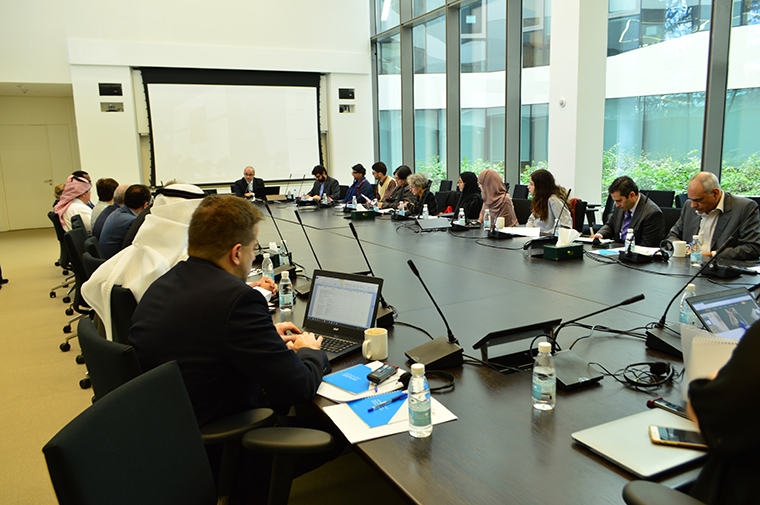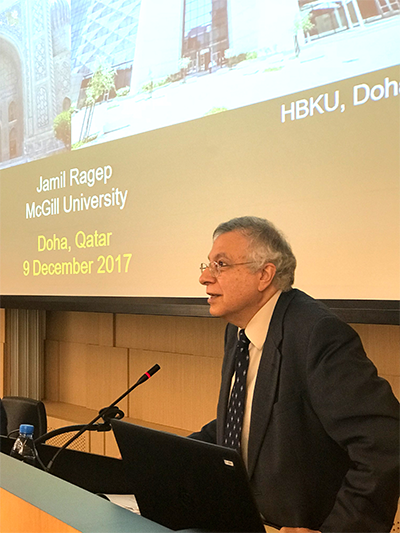In its continuous drive to promote thought, discourse and informed action on topics that are of theological and cultural significance, Hamad Bin Khalifa University’s (HBKU) College of Islamic Studies (CIS) invited public participants to two unique educational events, sponsored by Qatar National Research Fund (QNRF), on the cardinal role of science in Islam this week. The first event was a two-day workshop titled Science Education in the Muslim World, which preceded the public lecture Golden Age Redux: Can the Past Inform the Present? It examined the quality of scientific education taught across schools and other academic institutions in the Islamic world.

Describing the purpose of the workshop, Dr. Alexandre Caeiro, research assistant professor at CIS, highlighted the central place that scientific development and the preservation of religious identity occupies in Qatar’s modernizing project. He said: “Ongoing efforts to integrate science and religion, including in science education curricula, allow us to better understand how religion shapes and is shaped by other societal fields. The mission of the Islamic Civilization and Societies program at the College of Islamic Studies is to understand more precisely the visions of religion and conceptions of science that underlie this attempt at integration. In doing so, we can also start to consider what lessons may be derived from historical experiences and what kinds of Islamic futures can be imagined today.”
Featuring five panels in total, the workshop’s discussion sessions covered a wide range of topics, including Islam and Science: Historical Perspectives; International Perspectives on Science Education; State of Science Education in the Muslim World; Science and Science Education in Arabian Gulf States; and Science Education in Qatar. The list of workshop panelists involved scholars from universities in Qatar, including HBKU, Georgetown University in Qatar, Virginia Commonwealth University School of the Arts in Qatar, College of the North Atlantic – Qatar, and Northwestern University – Qatar. The panels also witnessed strong, international participation from McGill University, Hampshire College, University of Delaware, University of Exeter, American University of Beirut, İstanbul Medeniyet Üniversitesi and Basic Education College.
 Speaking on their role in creating a research culture in Qatar, QNRF officials shared a presentation with participants during the workshop to promote awareness about the fund’s mission and contributions to creating a knowledge-based society in line with the aspirations of the country.
Speaking on their role in creating a research culture in Qatar, QNRF officials shared a presentation with participants during the workshop to promote awareness about the fund’s mission and contributions to creating a knowledge-based society in line with the aspirations of the country.
To conclude the workshop, a lecture titled Golden Age Redux: Can the Past Inform the Present? Was delivered by Dr. Jamil Ragep, Canada Research Chair in the History of Science in Islamic Societies at the Institute of Islamic Studies at McGill University. The lecture began with a criticism of the prevalent view that science was marginal to pre-modern Islamic societies. Arguing that there was nothing inherently antithetical between the religion of Islam and science, Ragep gave examples not only of important Islamic advances in science and mathematics, but also how science had become embedded within Islamic institutions, such as the madrasa, and became a critical part of religious literature such as kalam (theology) and even Quran commentaries (tafsir).
He concluded that historical records show that science can flourish as an integral part of Islamic societies. Thus, contemporary science teachers and policy makers in the Muslim world would be well advised to work with their scientific communities to help continue this remarkable tradition, taking into account their own histories and cultural contexts. The lecture was followed by a lively discussion with the audience.
The workshop and lecture are the latest in a series of educational events organized by CIS. Scheduled to take place on December 31, 2017, CIS’s upcoming public lecture on Islam and Entrepreneurship: Stories of the Prophets is open for registration to the public.





